19 Best Crypto Wallets in 2024
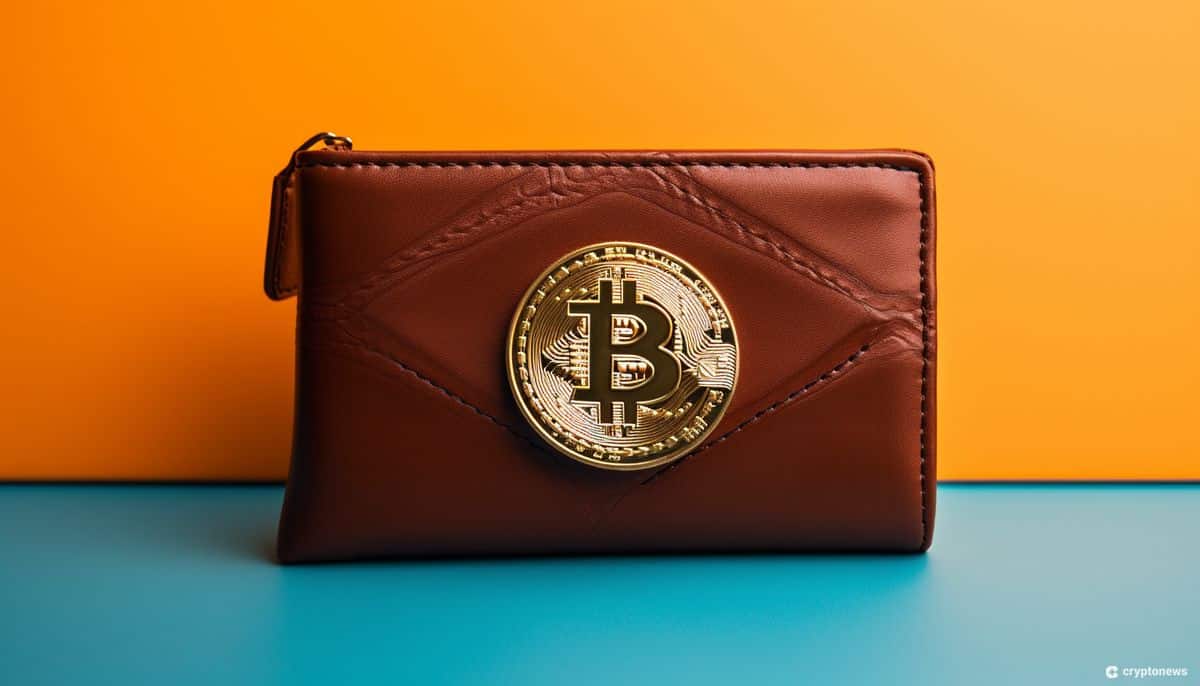
Navigating the world of cryptocurrencies can be overwhelming – especially for beginner traders. As more and more people become involved in the crypto market, understanding the importance of secure digital currency storage becomes crucial.
Considering that, this guide discusses the best crypto wallets for those just beginning their journey into the world of digital assets. We’ll explore the various types of cryptocurrency wallets available to traders before providing a quick-step walkthrough showcasing how to set up a secure wallet in minutes.
List of the Best Cryptocurrency Wallets
As experienced traders will know, identifying the best crypto to buy is just one part of the investment process – finding a safe and secure crypto wallet is just as important. Taking this into account, listed below are ten of the best Bitcoin wallets available to use right now:
- Zengo – Best crypto wallet in 2024; trade over 120+ cryptocurrencies directly in-app.
- ELLIPAL – Leading cold crypto wallet; air-gapped security features and 10,000+ coins
- Ledger – One of the best hardware wallets; purchase and stake crypto in-app.
- ByBit – User-friendly custodial app with access to Web3
- Binance – The world’s largest exchange with a free crypto wallet app.
- OKX – User-friendly crypto wallet with NFT support and DEX aggregator.
- Best Wallet – Multi-chain wallet with network bridges and built-in DEX
- Blockstream Jade – Bitcoin-only hardware wallet with open-source code
- NGRAVE ZERO – Air-gapped hardware wallet with military-grade security features
- Coldcard – Fully offline Bitcoin-only hardware wallet
- Trezor – Leading crypto hardware wallet with top-notch privacy features via Coinjoin.
- BitBox – Swiss hardware wallet with support for over 1500+ coins
- MetaMask – Best crypto wallet for multi-chain support
- Trust Wallet – Binance-owned wallet provider with 25m+ users
- Phantom Wallet – Best and most user-friendly Solana wallet
- Exodus – Super-Popular Bitcoin Wallet with Customizable Interface
- Safepal – Budget-friendly air-gapped wallets supporting 100+ blockchains
- SecuX – Biometric hardware wallet with multi-chain support
- OpenDime – Bitcoin USB stick with privacy focus
Reviewing the Best Bitcoin Wallets for Beginners
According to Statista, there were over 9,000 cryptocurrencies in existence in April 2024 – nearly double the number seen in February 2021, although it is estimated there could be many more given the vast numbers of new meme coins and projects sprouting up regularly.
This highlights the rapidly growing nature of the crypto market, which has naturally increased the need for secure wallet options. So, without further ado, let’s dive in and take a closer look at the top cryptocurrency wallets for beginners:
1. Zengo – Overall Best Crypto Wallet in 2024, 120+ Cryptocurrencies Supported
The Zengo mobile crypto wallet is our choice for the best crypto wallet in 2024. It has a rating of 4.2 stars on Trustpilot, with reviews from over 600 customers. It is available for iOS and Android and has received a rating of 4.78/5 on the Apple App Store and Google Play Store. Zengo offers customers 24/7 support, and Pro customers ($69.99 per year) get Priority Support, with responses guaranteed within 1 hour but typically received within 5 minutes.
Zengo is a feature-rich wallet whose features include:
- Support for 120+ cryptocurrencies
- Support for NFTs on multiple chains
- Buy, sell, and trade cryptocurrencies and NFTs
- 24/7 support
- dApp marketplace, with WalletConnect support
- Secured by MPC cryptography
- Seed-phrase-less account recovery
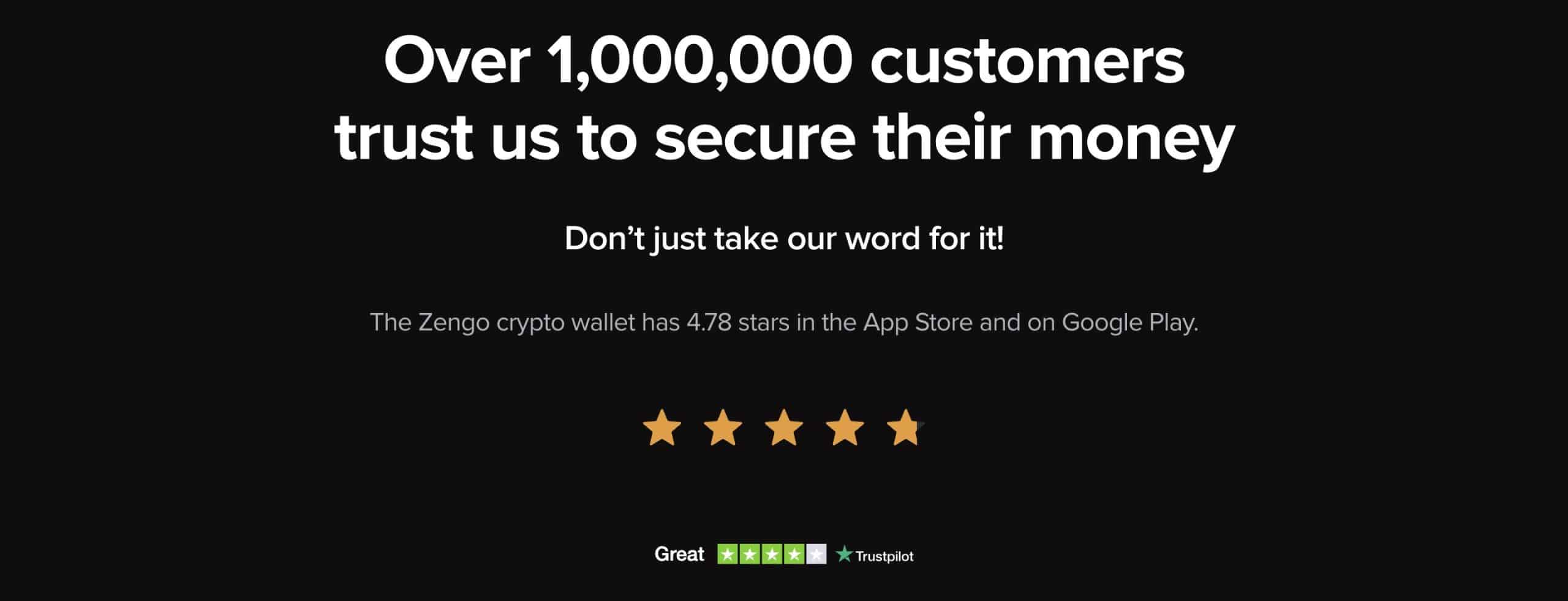
Zengo takes security very seriously, and the wallet undergoes annual code audits. The wallet is secured by multi-party computation (MPC) cryptography and does away with seed phrases by replacing them with a 3-factor authentication process that uses a 3D face scan, an email address, and a recovery file. Having been in operation since 2018, Zengo has served over 1 million customers, yet never had a report of a hack.
All these features and the heightened focus on security make it one of the best crypto wallets for both new and advanced users.
| Type of Wallet | Mobile wallet |
| Number of Supported Cryptos | 120+ cryptocurrencies |
| Fee to Buy Bitcoin | Varies by third-party supplier (0%–4.5%) |
| Mobile App? | Yes |
2. ELLIPAL – Best Cold Crypto Wallet with User-Friendly Features and Next-Level Security
ELLIPAL offers a blend of advanced security features and user-friendly functionality. The platform boasts compatibility with a huge array of assets, currently supporting 33 cryptocurrencies and over 10,000 tokens.
ELLIPAL offers a user-friendly experience facilitated by its intuitive interface and simplified transaction process. Users can easily initiate and confirm transactions through the ELLIPALApp, leveraging the device’s built-in camera for QR code scanning. This demystifies some of the complexity of hardware wallets for new users while maintaining a high level of security.
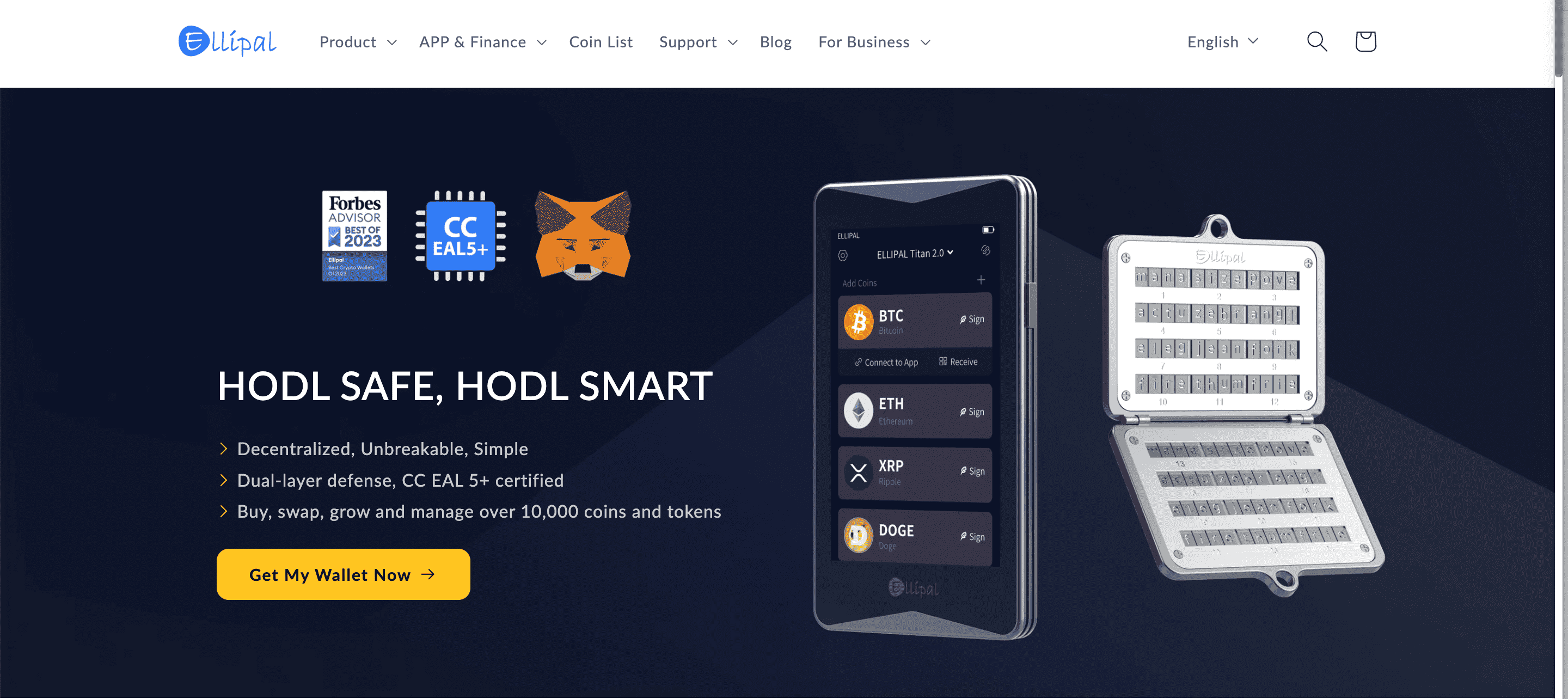
ELLIPAL produces a range of high-tech cold wallets, which are physical hardware devices that prioritize the safety of users’ digital assets by employing an air-gapped cold storage approach. This means that private keys, the essential components for accessing and managing cryptocurrencies, are kept entirely offline, effectively mitigating the risks associated with online vulnerabilities such as malware attacks and remote hacking attempts. Moreover, the device’s tamper-proof design, fortified with anti-tamper and auto-destruct features, means that any breach attempts trigger the deletion of stored private keys, safeguarding funds from unauthorized access.
ELLIPAL has 3 types of hardware wallets, the ELLIPAL Titan 2.0, the ELLIPAL Titan, and the ELLIPAL Titan Mini to suit different users and price ranges. They all support NFTs and multiple accounts while being compatible with the ELLIPAL mobile app.
| Type of Wallet | Hardware wallet |
| Number of Supported Cryptos | 33+ cryptocurrencies |
| Fee to Buy Bitcoin | Varies by third-party supplier (0%–4.5%) |
| Mobile App? | Yes |
3. Ledger – Best Hardware Wallet for Security and Multi-Chain Functionality
The Ledger crypto wallet is a hardware wallet widely considered one of the safest ways for investors to store their digital assets, whether that be cryptocurrencies or NFTs. This is because it uses “cold storage,” meaning users’ private keys are kept offline and safe from threats.
Ledger comes with a mobile and desktop app called Ledger Live where you can monitor your crypto portfolio, regardless of which blockchain, you can buy crypto with fiat, stake your coins or exchange them. Each Ledger wallet supports over 5,500+ crypto assets.
The Ledger app also lets you connect with third-party services, such as 1inch DEX, MoonPay, Lido staking, YouHodler and more.
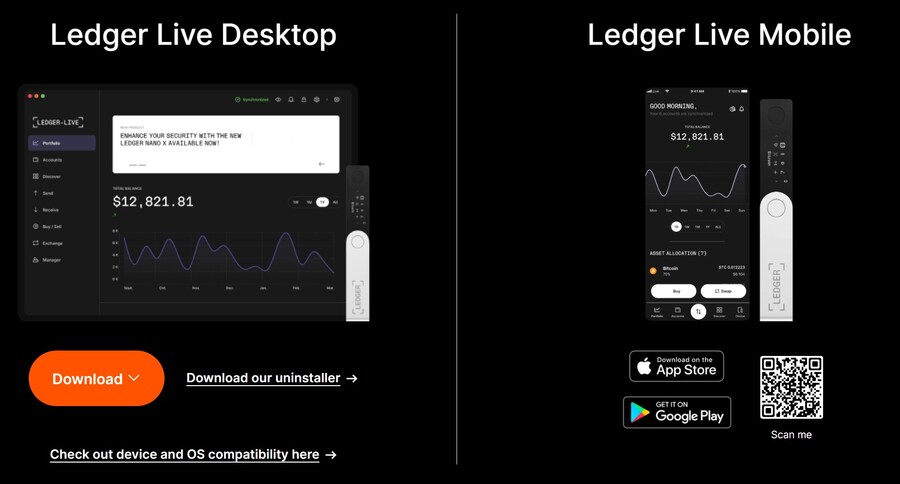
To use the Ledger wallet, you need either the Ledger Nano X, Ledger Nano S Plus, or the Ledger Stax. Nano X is particularly interesting since it doesn’t just boast USB functionality, but it can also connect to devices via Bluetooth. This means you can safely execute transactions on your smartphone without connecting the Ledger wallet via cable.
This hardware crypto wallet even sells physical “chains” that allow crypto-savvy individuals to wear their Ledger wallet around their neck!

Ledger also has a vast library of educational resources where you can learn everything about Web3, including how to stake coins, what is cloud mining and more.
| Type of Wallet | Hardware |
| Number of Supported Cryptos | 5,500+ |
| Fee to Buy Bitcoin | Varies based on exchange used |
| Mobile App? | Yes (Ledger Live) |
4. Bybit – Leading Custodial Wallet That Gives Users Access to the World of Web3
The Bybit Wallet offers users a seamless gateway into the decentralized world of cryptocurrencies, including DeFi, GameFi, and NFTs, all while ensuring the security of their assets and private keys. With a simple one-click setup, users gain immediate access to the Web3 ecosystem, with various decentralized applications (dApps) and services. The multi-chain wallet supports over 400 coins and users can trade them using the ByBit exchange through the mobile app.
Its intuitive interface makes navigation easy, allowing users to explore Web3 technologies effortlessly. Plus, the integrated dApp aggregator provides a curated selection of decentralized applications for users to discover and use.
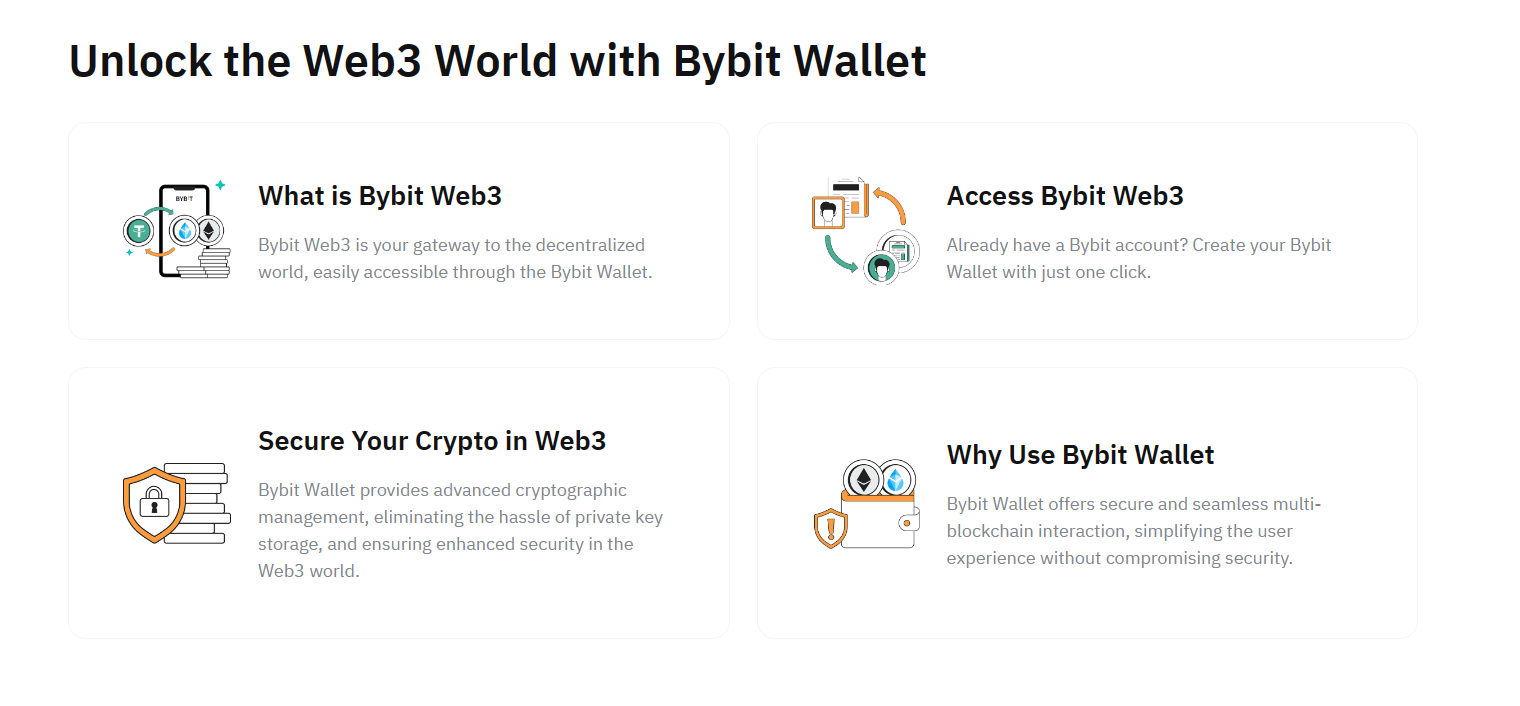
In terms of security, Bybit employs stringent measures to safeguard users’ funds and data. The majority of assets are stored in cold storage, minimizing the risk of unauthorized access. Additionally, the implementation of two-factor authentication (2FA) enhances account security,
ByBit also has various educational resources such as ByBit Learn and Crypto Insights, where you can learn everything Web3. This can help beginners get to grips with some of the features offered on ByBit, including staking, leverage, and the various dApps.
| Type of Wallet | Custodial software |
| Number of Supported Cryptos | 400+ |
| Fee to Buy Bitcoin | Varies based on the provider used |
| Mobile App? | Yes |
5. Binance – World’s Largest Exchange with Free Crypto Wallet App
Binance needs no introduction as it remains the world’s largest cryptocurrency exchange, facilitating daily trading volumes of over $6 billion. The exchange offers its own crypto wallet that links to the BNB Chain – Binance’s own blockchain network.
Unlike other top cryptocurrency wallets, the Binance wallet is structured as a browser extension, downloading on Google Chrome and other leading platforms. It’s free to download and use, enabling Binance users to store and manage their crypto holdings while interacting with other assets on the BNB Chain and Ethereum.

Since the Binance wallet is inherently linked to the Binance exchange, users can instantly transfer their holdings from the latter to the former. The wallet supports over 380 cryptos and allows users to buy crypto instantly using a bank transfer or credit/debit card.
Those looking to explore the Binance ecosystem further can check out the exchange’s NFT marketplace and earnings protocols. Binance is also fantastic for active investors since it allows anyone to set up recurring buy orders to purchase specific assets at regular intervals.
Finally, the Binance crypto wallet enables users to send and receive crypto using QR codes instantly. This feature is essential for newcomers, as it mitigates the risk of using an incorrect wallet address and potentially losing funds forever.
| Type of Wallet | Software |
| Number of Supported Cryptos | 1,000+ |
| Fee to Buy Bitcoin | 0.1% trading fee |
| Mobile App? | Yes |
6. OKX – Best for NFT Support & DEX Aggregator
Another hugely popular crypto wallet app suitable for beginners is the OKX wallet. OKX describes its wallet as a “portal to Web3” since it contains various helpful features, including crypto asset storage, NFT support, and a decentralized exchange (DEX).
The great thing about the OKX wallet is its cross-chain support. At the time of writing, the wallet supports crypto assets from over 50 networks, including Ethereum, Polygon, Avalanche, and OKTC. The OKX wallet’s interface is easy to navigate and doesn’t feature any complex jargon, making it suitable for beginners.
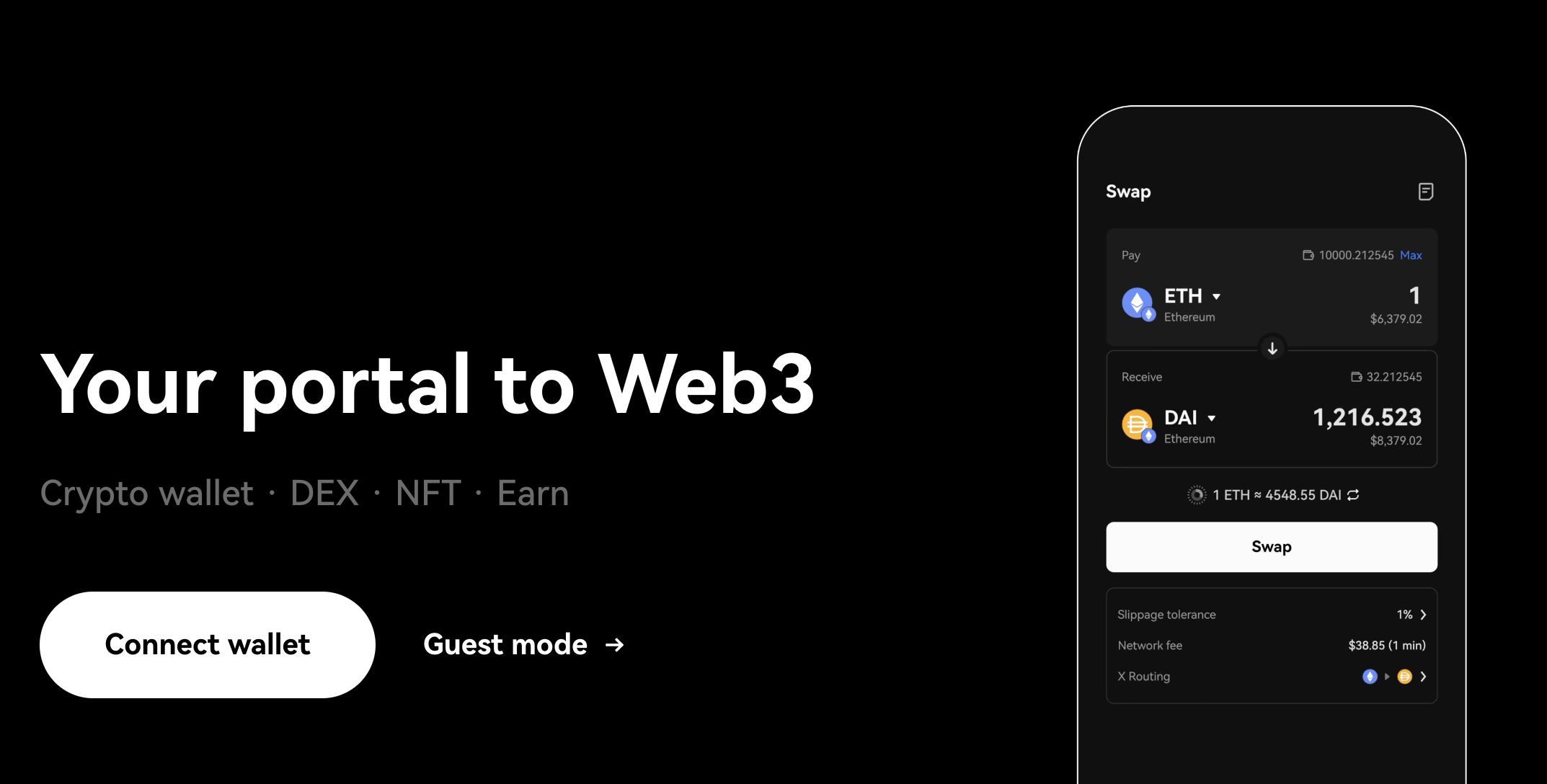
OKX’s wallet is also highly compatible with a range of devices. It can be downloaded for free on iOS and Android smartphones, although it’s also available on Windows and MacOS computers. The wallet’s features sync across all devices, so users can seamlessly transition from one to another.
This is also one of the top crypto wallets for those interested in NFT investing. The OKX wallet features a “one-stop NFT aggregator platform,” which supports 11+ networks and offers free creation and trading services. This platform features some of the world’s most sought-after collections – including DeGods and Bored Ape Yacht Club (BAYC).
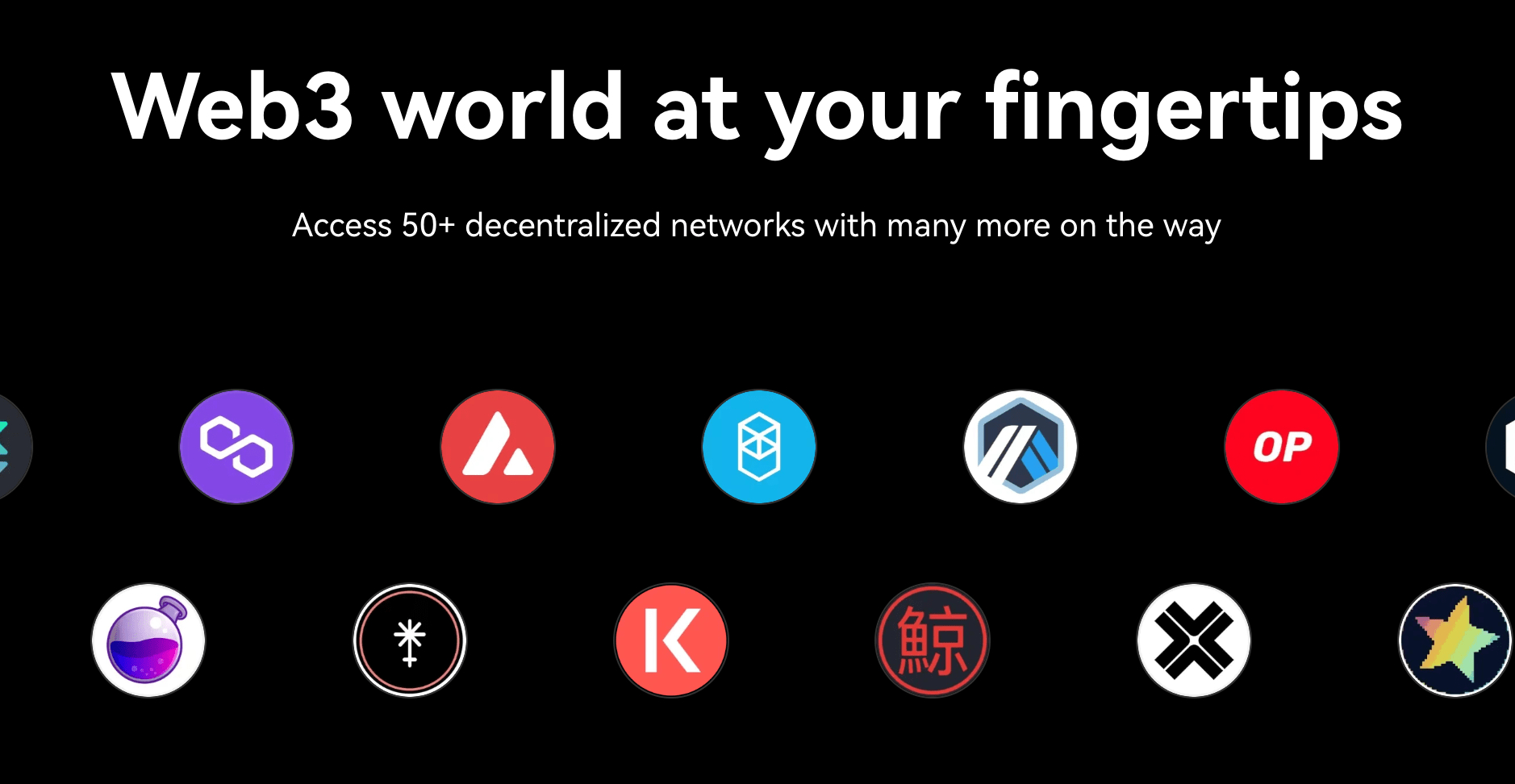
Aside from checking out the best NFTs to buy, wallet users can also earn a yield on their crypto assets. This works through the “Earn” feature, which has various subcategories, such as “Save” and “Farm.” The feature uses DeFi protocols to maximize users’ earnings potential; for example, ETH holders can receive an annual percentage yield (APY) of over 5%.
Finally, the OKX wallet has a DEX and bridge aggregator that instantly lets users swap tokens across many top blockchains. Due to this and the features mentioned above, the OKX wallet is undoubtedly one of the best crypto wallets available right now.
| Type of Wallet | Software |
| Number of Supported Cryptos | 3,000+ |
| Fee to Buy Bitcoin | Maker-taker fee based on 30-day trading volume |
| Mobile App? | Yes |
7. Best Wallet – Best Multi-Chain Wallet With Network Bridges and Built-In DEX
Topping our list of the best crypto wallets in 2024 is Best Wallet, which has only just launched but already shot to the top of our list because of its unique features.
This is a multi-chain crypto hot wallet designed to address some of the challenges present in many current wallet offerings – such as multiple wallets required for various blockchains, lack of crypto news within the wallet, network bridges and NFT marketplaces.
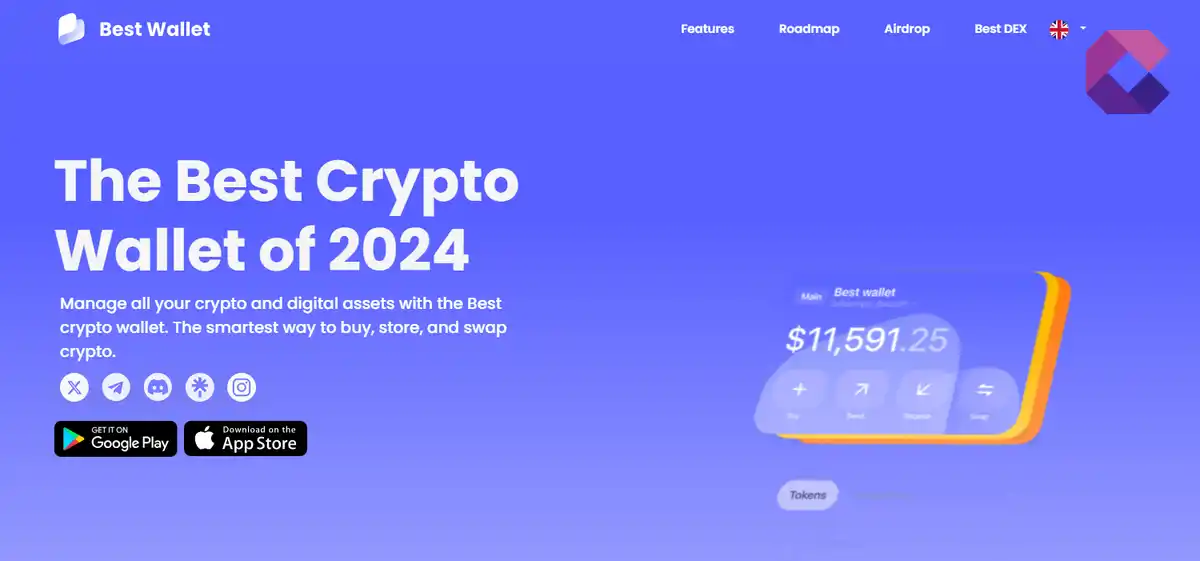
To address this, the creators of Best Wallet have created a comprehensive Web3 ecosystem that covers every aspect of digital asset management.
The non-custodial software wallet, available as a mobile app, allows users to interact with coins, tokens, and NFTs from multiple chains such as Bitcoin, Ethereum and BNB. This ensures users aren’t confined to a single chain, allowing them to access limitless digital assets.
It also has several unique features that place it above other wallets – that includes market insights on trending and upcoming tokens, details on token airdrops, and even a built-in decentralized exchange to allow users to trade any token. Best Wallet is shaping up to be one of the best no KYC crypto exchanges on the market.
Acting as the backbone of the ecosystem is the $BEST token, which is the utility and governance token. Holders who stake $BEST tokens will receive benefits, including access to advanced analysis tools, swaps without fees, early token launch access, and NFT drops.
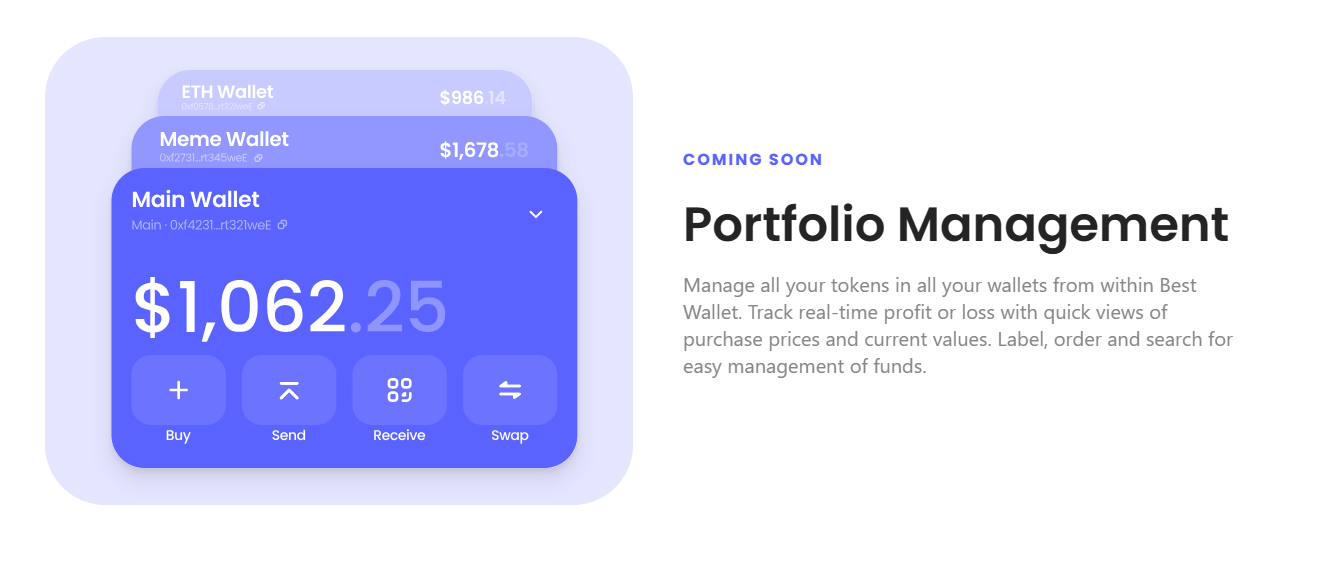
The tokens are not yet available but regular users of the wallet are set to get a huge airdrop of tokens in the coming months – with a total of 10% of the supply will be distributed to active users.
All in all, Best Wallet aims to be more than just a crypto wallet, with the developers seeking to make it a comprehensive digital asset management solution for multiple blockchains.
Follow Best Wallet on X and on the Best Wallet Telegram channel to get up-to-date information on the project.
| Type of Wallet | Software |
| Number of Supported Cryptos | Thousands through the DEX |
| Fee to Buy Bitcoin | via Wert |
| Mobile App? | Yes |
8. Blockstream Jade – Best Bitcoin Wallet with QR Code Scanner
Blockstream Jade is a leading hardware wallet designed for Bitcoin hodlers. The Bitcoin-only wallet also comes with a camera, allowing users to scan QR codes for transactions, streamlining sending and receiving funds. The device is entirely open-source (hardware and software), which helps ensure the wallet is secure and reliable. Anyone can review, audit, and contribute to the code meaning vulnerabilities are quickly spotted and addressed.
Blockstream Jade is also compatible with Blockstream’s Green Wallet software, which serves as a user-friendly interface for interacting with cryptocurrency assets. Users can easily manage their funds, initiate transactions, and monitor their portfolio’s performance, all while benefiting from the enhanced security provided by the hardware wallet.
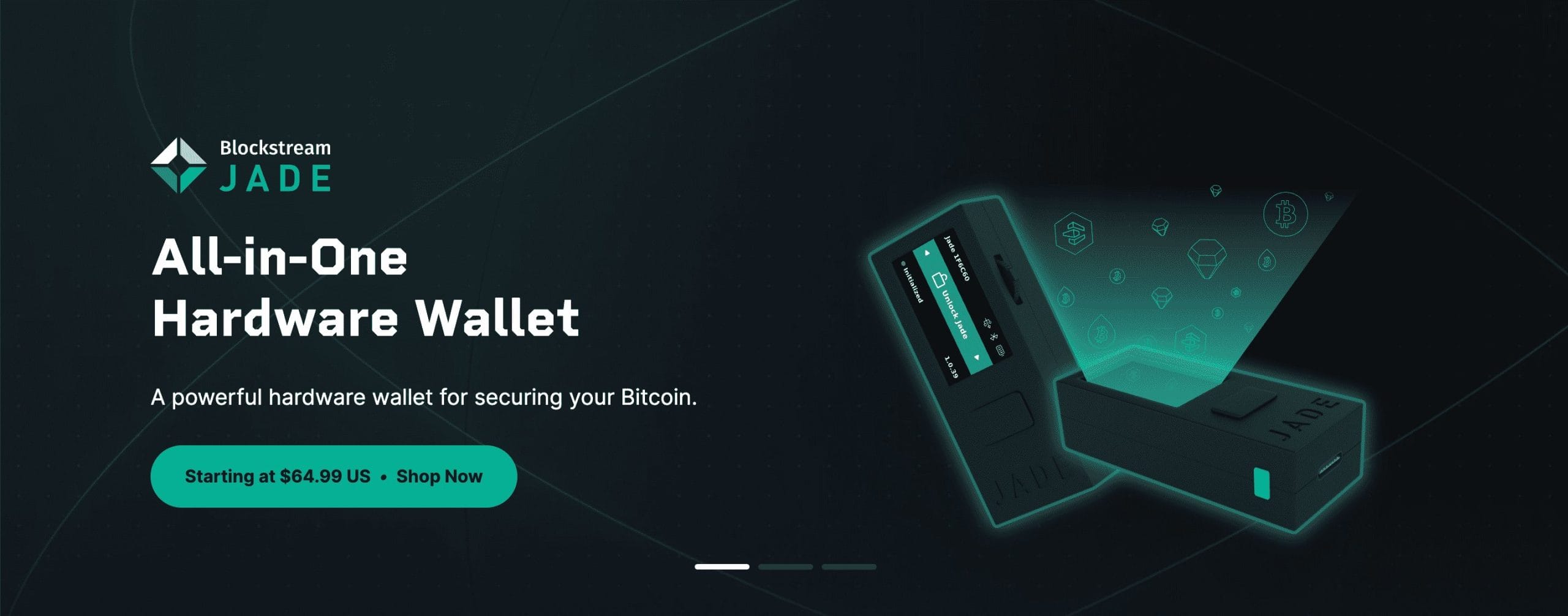
The LED screen allows you to confirm transactions and verify addresses without connecting the device to the internet. This adds an extra layer of protection as transactions are “air-gapped.” You can also view your recovery seed on the device without an internet connection.
The wallet also supports multi-sig transactions and Liquid (a Bitcoin layer-2 solution enabling the fast, confidential settlement and issuance of digital assets, such as stablecoins and security tokens) assets. Overall it’s a great choice for
| Type of Wallet | Hardware wallet |
| Number of Supported Cryptos | Bitcoin |
| Fee to Buy Bitcoin | Need to buy with another platform and transfer to wallet |
| Mobile App? | Yes (Blockstream Green) |
9. NGRAVE ZERO – Best Air-Gapped Hardware Wallet with Top Security Features
Similar to the ELLIPAL Titan and Blockstream Jade, Ngrave offers a completely air-gapped wallet. For added security, there’s no internet connectivity, WiFi, NFC, Bluetooth, or USB support. All transactions are carried out using QR codes and cameras. The wallet uses these QR codes to communicate with the NGRAVE mobile app.
LIQUID is the companion mobile app for the NGRAVE wallet, users can manage their NFTs, confirm transactions, and send and receive funds. To buy crypto, you’ll need to use another platform and then transfer your tokens to your NGRAVE wallet.
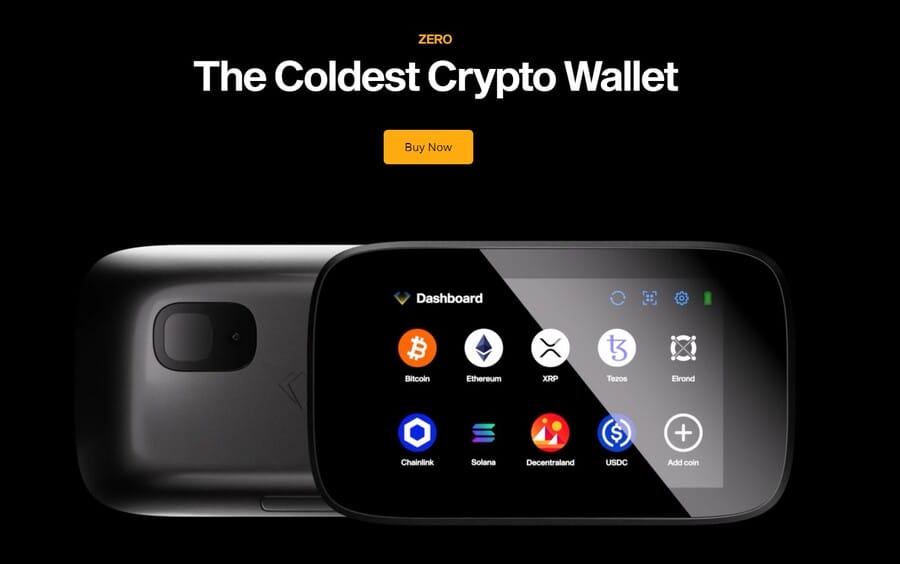
Security is a top priority for NGRAVE, and the wallet boasts the highest-security-certified OS in the world (EAL7). This is a first in the crypto wallet space, and the wallet also has a fingerprint reader for an added layer of protection. Private key generation is done through a combination of a random number algorithm, your fingerprint, and even the ambient light in the room. This makes reverse engineering of the key next to impossible.
| Type of Wallet | Hardware wallet |
| Number of Supported Cryptos | 20+ cryptocurrencies and ERC-20 support |
| Fee to Buy Bitcoin | Not available through app or wallet |
| Mobile App? | Yes |
10. Coldcard – Best Air-Gapped Hardware Wallet for Bitcoin Hodlers
Another Bitcoin-only wallet, Coldcard places a high emphasis on security and protecting your BTC. It’s become a popular choice amongst those seeking complete self-custody and control of their assets and secure offline storage.
Coldcard makes use of a range of security features. It uses dedicated microchips to store your private keys, a PIN entry requirement, 2FA, and a “Duress PIN” feature which displays a zero balance in the case of someone gaining access to your device. Other features include NFC taps for close proximity transactions and an MK4 virtual disk drive.
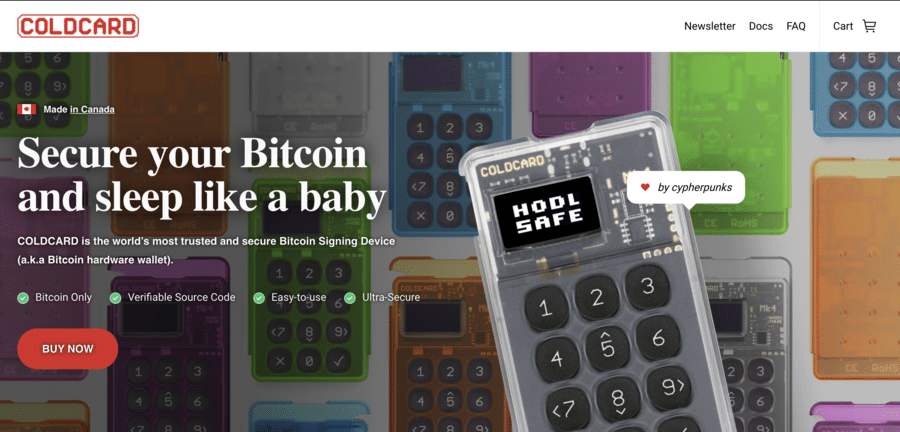
It’s designed to be truly air-gapped, and the wallet can be used without ever connecting to a computer. The wallet is compatible with popular Bitcoin desktop apps like Electrum and Wasabi Wallet. This makes it easy for users who want to manage their Bitcoin through a computer interface while still benefiting from the security features of Coldcard. Like many hardware wallets, Coldcard has a bit of a learning curve for those new to hardware wallets but provides top-level security.
| Type of Wallet | Hardware wallet |
| Number of Supported Cryptos | Bitcoin |
| Fee to Buy Bitcoin | Varies by third-party supplier (0%–4.5%) |
| Mobile App? | Yes |
11. Trezor – Best Security-Focused Hardware Wallet with Simple Functionality
Trezor is one of the most secure wallets in the whole market and for those looking for simple offline storage it is a go-to choice.
There are three Trezor wallets available: Model One, Trezor Safe 3, and the advanced Model T, which features a touch-screen that allows for two-factor authentication on the device itself.
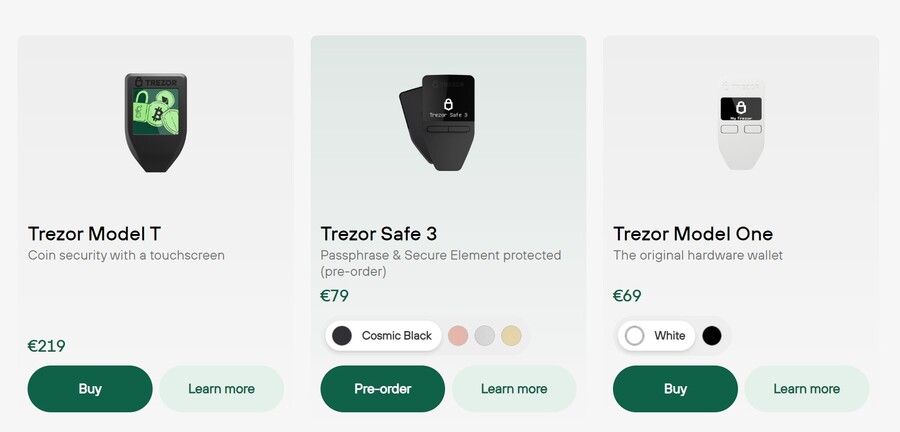
Trezor’s added security also allows users to generate up to 16 recovery shares and store them in different places, meaning if one seed phrase is compromised then there are additional layers of protection.
It is also open source meaning its software is consistently reviewed and tested by third parties to keep its security transparent – main rival Ledger has closed-source firmware.
Trezor comes with its own desktop, mobile and browser app, called Trezor Suite. This lets you manage your coins by sending or receiving them, you can verify transactions or go incognito with Coinjoin. You can also directly purchase cryptocurrencies from within the app.
| Type of Wallet | Hardware |
| Number of Supported Cryptos | 8,000+ |
| Fee to Buy Bitcoin | Varies based on exchange used |
| Mobile App? | Yes (Trezor Suite) |
12. BitBox – Best Hardware Wallet with ERC-20 Support
BitBox Wallet is a secure and user-friendly cryptocurrency wallet designed to simplify the storage and management of digital assets. Developed by Shift Cryptosecurity, BitBox Wallet prioritizes security and privacy while offering a seamless user experience.
The wallet is a hardware wallet, meaning it stores users’ private keys offline on a physical device which ensures that users’ funds remain safe even if their computer or mobile device is compromised. In addition to its hardware security features, BitBox Wallet also incorporates advanced encryption techniques to safeguard users’ data and transactions. With built-in support for multi-signature authentication and passphrase protection, users have multiple layers of security to prevent unauthorized access to their funds.
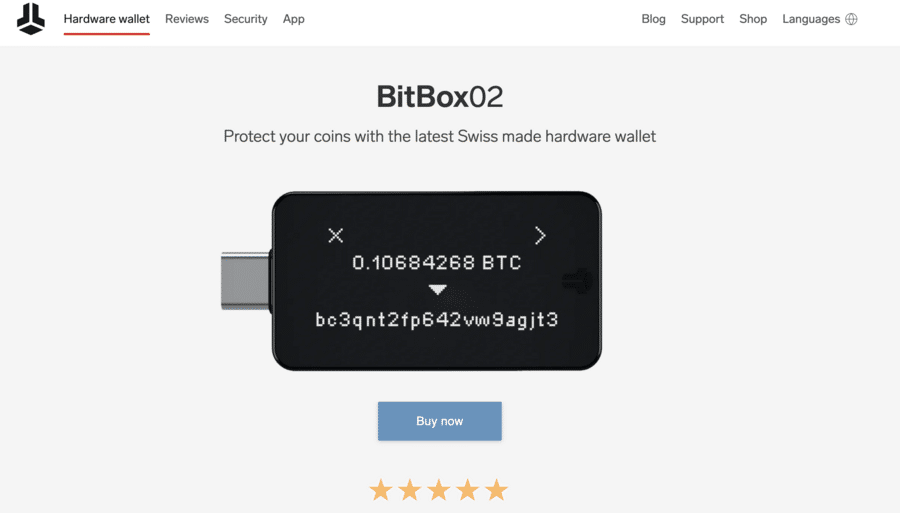
The companion app also features an intuitive and user-friendly interface, making it easy for both beginners and experienced users to navigate and manage their cryptocurrency holdings. The app is available on mobile and desktop for convenience. The wallet supports a wide range of digital assets, including Bitcoin, Ethereum, Litecoin, and many others, allowing users to diversify their portfolios with ease. Users can also connect the BitBox wallet to other wallets, including Electrum, SPecter, and MyEtherWallet.
| Type of Wallet | Software |
| Number of Supported Cryptos | Bitcoin, Litecoin, Cardano, Ethereum, EVM network, and ERC-20 tokens |
| Fee to Buy Bitcoin | Depends on payment provider |
| Mobile App? | Yes |
13. MetaMask – Best Crypto Wallet for Multi-Chain Support
Those seeking the best cryptocurrency wallet may also wish to check out MetaMask. MetaMask has over 20 million active users worldwide and acts as a “gateway” into the world of Web3. Wallet users can interact with thousands of dApps, store NFTs, and even participate in gaming platforms.
One of MetaMask’s best features is its multi-chain support. The wallet can hold tokens minted on various networks, such as Ethereum, BNB Chain, Avalanche, and Polygon. It’s also free to download and available as a browser extension or a smartphone app.

Beginners pondering “Is cryptocurrency a good investment?” will easily be able to discover new assets through MetaMask’s token exchange feature, which allows users to buy, store, and swap coins/tokens instantly. Interestingly, MetaMask also has a built-in DeFi browser that enables users to utilize thousands of dApps, providing scope for limitless earnings opportunities.
Importantly, MetaMask also gives users a “self-custody” option. This means that users can retain complete control over their private keys – a rare feature for online wallets. This is one of the distinguishing factors of the best decentralized crypto wallets. As such, MetaMask doesn’t store any data about the wallet, which reduces the risk that the wallet could be subject to a cyberattack.
| Type of Wallet | Software |
| Number of Supported Cryptos | 500,000+ |
| Fee to Buy Bitcoin | Varies depending on provider (e.g. 3% for card purchases) |
| Mobile App? | Yes |
14. Trust Wallet – Best for Newcomers to Crypto
Trust Wallet is a wallet provider owned by the Binance exchange, offering support to over 40 blockchains and 160,000+ coins/tokens. This wallet is used by more than 25 million people and is designed to streamline the buying, selling, and storing process for beginners.
With Trust Wallet, users can quickly backup and restore their accounts using a recovery phrase – a handy feature that safeguards newcomers. Trust Wallet doesn’t collect personal data from users and can be downloaded for free on Android or iOS devices.

Trust Wallet’s main appeal is its user-friendliness since it allows users to instantly buy crypto using a credit/debit card from within the app. The wallet also has a token-swapping feature and an earning protocol, allowing users to generate interest on their idle crypto holdings.
Like other top crypto wallets, Trust Wallet also allows users to explore the world of NFTs and dApps. Users can store their NFTs safely while checking out the latest dApps – including blockchain-based games. Finally, given that the wallet is owned by Binance, users also benefit from the safety and security associated with the exchange.
If Trust Wallet doesn’t quite suit your trading needs we recommend reading our article on the best Trust Wallet alternatives in 2024.
| Type of Wallet | Software |
| Number of Supported Cryptos | 160,0000+ |
| Fee to Buy Bitcoin | 0.1% transaction fee |
| Mobile App? | Yes |
15. Phantom Wallet – Best Solana Wallet
Phantom Wallet is a popular cryptocurrency wallet designed specifically for the Solana blockchain. It is known for its user-friendly interface and seamless integration with the Solana ecosystem, allowing users to store, send, and receive SOL (Solana’s native cryptocurrency) and other compatible tokens.
Phantom started out life as a browser extension, making it easy for users to manage their Solana assets directly from their web browsers, whether they use Chrome, Firefox, Edge, or Brave. However, you can now also download the app for iOS and Android.

The wallet makes transactions on the Solana blockchain quick and easy, exploiting Solana’s high-speed and low-cost transaction capabilities. It is designed to be intuitive and easy to use, easy to set up and suitable for beginners thanks to its friendly, colorful design, and highly efficient to suit the needs of more experienced cryptocurrency users.
Phantom Wallet is open-source, allowing the community to review its code for transparency and security.
| Type of Wallet | Software |
| Number of Supported Cryptos | 1,000+ |
| Fee to Buy Bitcoin | 0.85% |
| Mobile App? | Yes |
16. Exodus – Best Customizable Interface
Exodus is a desktop/mobile wallet application that allows users to store and manage over 260 cryptocurrencies and NFTs. This wallet has multi-chain support, making it ideal for those who regularly interact with networks like Solana, Ethereum, and the BNB Chain.
The Exodus wallet is all about functionality, with users able to instantly buy crypto using a credit/debit card or bank transfer. Exodus also allows users to withdraw funds to an external bank account or even their PayPal account. Another cool feature is that users can quickly exchange one token for another without completing extensive KYC checks.

Most users praise the Exodus wallet for its beautiful interface, which can be customized with various themes and skins. Like most wallets, Exodus also provides access to the world of DeFi, allowing users to generate a yield on their assets.
Finally, the Exodus wallet can even be linked to the hardware wallets offered by Trezor, enabling users to boost their security level.
| Type of Wallet | Software |
| Number of Supported Cryptos | 320+ |
| Fee to Buy Bitcoin | Spread + 2% processing fee |
| Mobile App? | Yes |
17. Safepal – Best Budget-Friendly Hardware Wallet
Safepal is a user-friendly – and wallet-friendly – option for traders interested in a cold storage wallet. It combines top-notch security features with user-friendly features and support.
It’s a good cold wallet for those with a diverse portfolio, as the wallet supports over 40 blockchain networks and thousands of different coins and tokens.
One notable feature of SafePal is its integration with decentralized exchanges (DEXs) and other DeFi protocols, allowing users to trade their assets directly from the wallet interface. This integration provides users with seamless access to the decentralized finance ecosystem, enabling them to participate in various DeFi activities such as lending, borrowing, and yield farming.
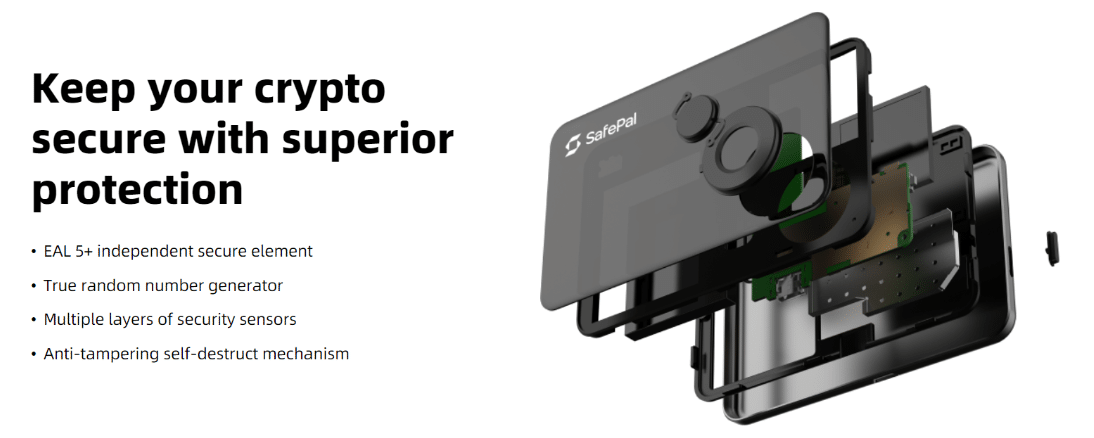
Safepal also offers a software wallet, making it easy to use your funds for trading and accessing Web3 while keeping the majority of your assets in cold storage. It even comes with a browser extension, making it one of the most user-friendly hardware wallets for those used to the simplicity of hot wallets like MetaMask.
While many hardware wallets have a hefty price tag, Safepal offers budget-friendly options, with all its products coming in at under $100. This makes it a great option for those looking for a secure but affordable way to manage their crypto.
| Type of Wallet | Hardware |
| Number of Supported Cryptos | 10,000+ |
| Fee to Buy Bitcoin | 3.5% – 5% |
| Mobile App? | Yes |
18. SecuX – Best Biometric Hardware Wallet
SecuX offers a series of hardware wallets designed to provide users with a secure and user-friendly solution for storing and managing their cryptocurrency assets. Their wallets include the Shield BIO, a credit card-style wallet with biometric authentication. All wallets feature a secure element chip, high-security software (EAL5+), offline seed phrase setup, pin protection, and support for thousands of coins. The larger wallets offer Bluetooth connectivity, larger LCD screens, and NFT support.
The most popular wallet is the V20 hardware wallet which is compatible with the SecuX mobile app. It supports multiple chains and up to 500 accounts. The large touchscreen displays provide a comfortable and efficient user experience, allowing users to view their balances, send and receive transactions, and access advanced features with ease.
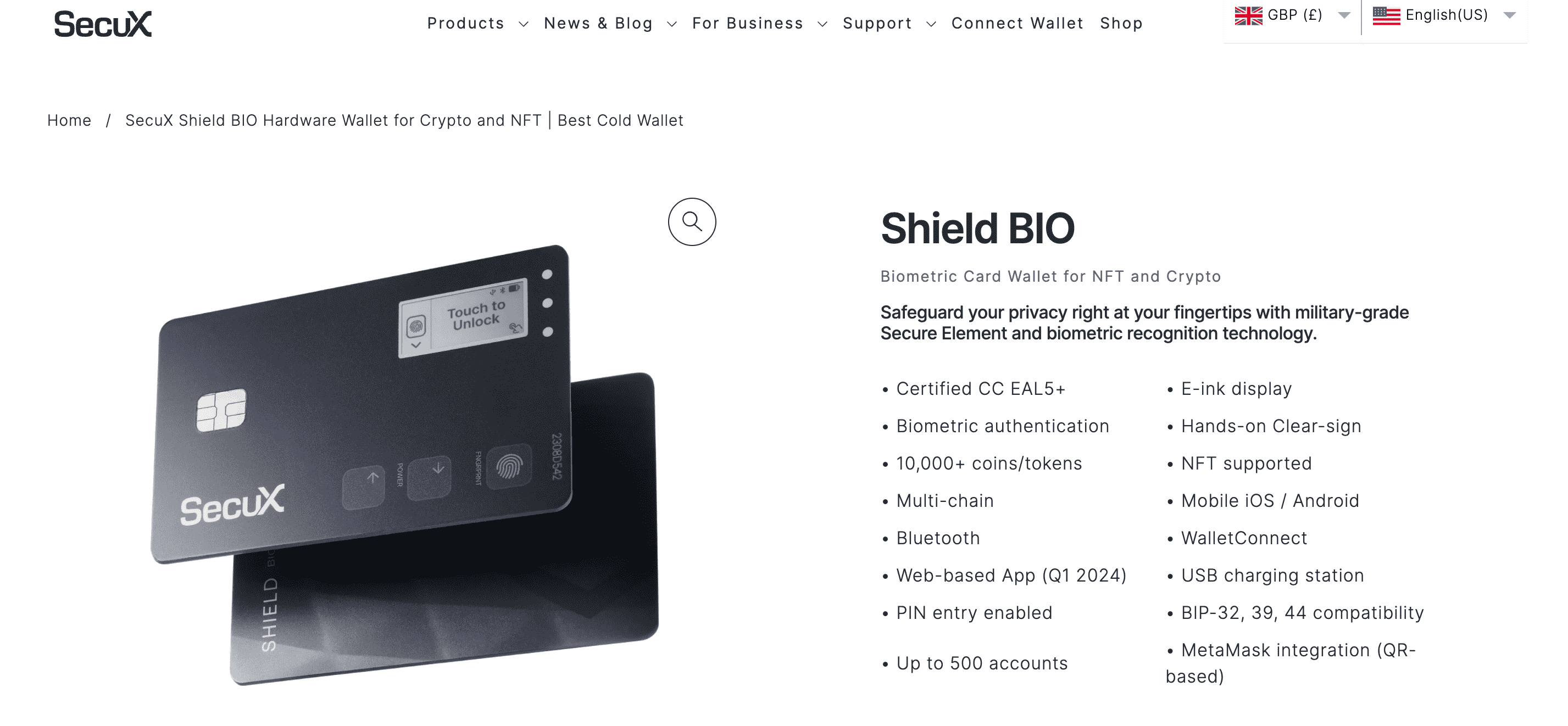
SecuX Wallets also offer seamless integration with desktop and mobile devices, allowing users to manage their cryptocurrency assets on the go. The wallets support Bluetooth and USB connectivity, enabling users to connect to a wide range of devices, including smartphones, tablets, and computers, for added convenience and flexibility.
| Type of Wallet | Hardware |
| Number of Supported Cryptos | 10,000+ |
| Fee to Buy Bitcoin | Spread + 2% processing fee |
| Mobile App? | Yes |
19. OpenDime – Best Wallet for In-Person Transactions
OpenDime is a unique hardware wallet that lets you spend Bitcoin “like a dollar bill.” Unlike traditional hardware wallets, which store private keys offline in a secure element chip, OpenDime stores private keys on a physical USB stick. This physical storage mechanism allows users to physically transfer ownership of their cryptocurrency assets by physically handing over the USB stick, making it ideal for in-person transactions or gifts.
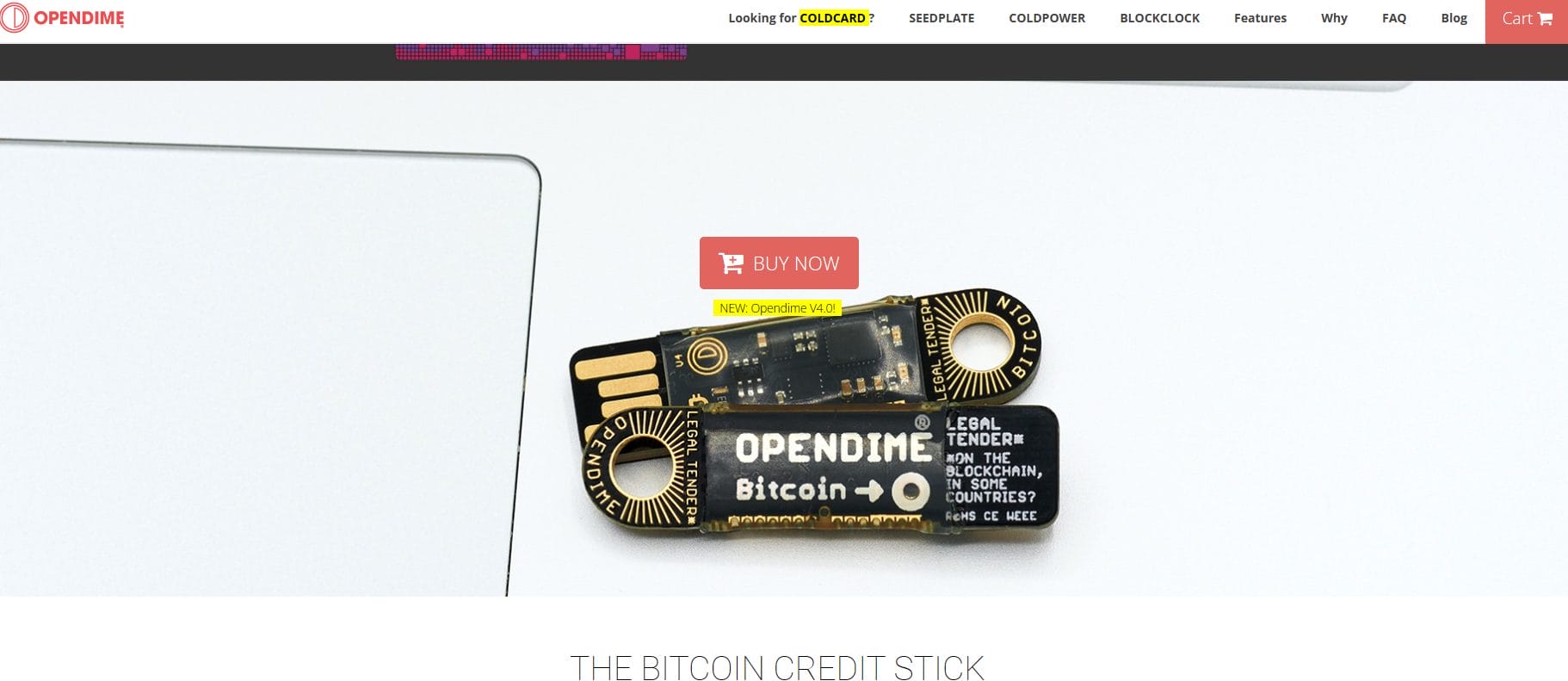
OpenDime provides a simple and intuitive interface that is easy to use for users of all experience levels. To access their funds, users simply plug the OpenDime device into a USB port and use the accompanying software to view their balance and initiate transactions.
OpenDime also offers a high level of privacy and anonymity. Because OpenDime devices do not require any personal information or registration, users can maintain their privacy while using the wallet. Additionally, OpenDime devices are disposable, meaning they can be safely disposed of after use without leaving any traceable information behind.
| Type of Wallet | Hardware |
| Number of Supported Cryptos | Bitcoin |
| Fee to Buy Bitcoin | Need to use third party app |
| Mobile App? | No |
Crypto Wallets Explained
Now that we’ve identified the best crypto wallets for beginners, let’s take a closer look at what these wallets are. In simple terms, cryptocurrency wallets are software programs or hardware devices that allow users to store, manage, and transfer popular cryptocurrencies like BTC and ETH.
These wallets act as the holder’s “portal” to the crypto market, making it easy to hold crypto assets safely over the long term. Various types of wallets are on offer, such as “hot” and “cold” wallets, which offer varying degrees of safety and functionality.
We’ll explore these wallet types in more detail later, but it’s important to note that all wallets have a “public” and “private” key. These keys are essential since they prove asset ownership and enable wallet holders to send/receive funds.
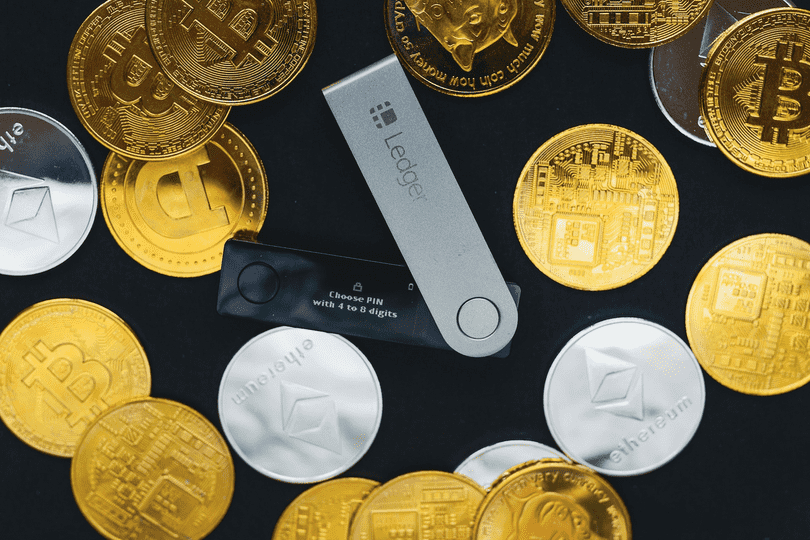
According to a report by TripleA, it’s estimated that over 420 million people worldwide own crypto. Most of these people are based in Asia and North America, although this figure is growing every month. Due to this vast customer base, the importance of using crypto wallets is more significant than ever – especially since the market is still relatively unregulated compared to “traditional” asset classes and hackers and scammers are extremely active.
Ultimately, crypto wallets act as a way to store crypto safely without keeping it on an exchange or brokerage account, giving an individual more power over their holdings. Although there are various types of crypto wallets with specific features and security measures, all of them are designed to serve this purpose.
How Do Bitcoin Wallets Work?
Whether someone’s looking to invest in the cryptos with the most potential or is more interested in well-established coins, it’s vital to understand how wallet storage works. Regardless of where the Bitcoin account is held, using a crypto wallet is critical for protecting crypto asset holdings from cyber attackers and other bad actors.
The simplest way of viewing crypto wallets is as a method for protecting an investor’s holdings via access to their public and private keys. As noted above, these keys have essential use cases – but what do they do? Here’s a quick overview:
- Public Key: The public key can be considered the wallet’s “account number” and is used to receive funds from other individuals/businesses.
- Private Key: The private key is an alphanumeric code unique to each wallet and used to prove ownership of the crypto assets inside. In this sense, the private key is like a password – meaning it should never be shared with anyone else.
Crypto wallets store and manage the private key – not the actual crypto assets. This is because the crypto assets are still held on the blockchain, meaning the private key simply provides access to them.
Crypto wallets are so important because they use advanced cryptographic techniques to protect the user’s private key, essentially a password. Different wallets have different approaches, but they can range from DDoS protection to biometric verification – and even 3D face scans.

The best crypto wallets usually offer backup and recovery options that ensure users can’t lose access to their crypto. In the past, if a user lost their private key, their crypto assets could never be re-accessed. Nowadays, many wallet providers have recovery seed phrases and other features that can restore access, although it is important individuals also take great care not to share or lose those.
Whether a user opts for a crypto hardware wallet or a software wallet, partnering with a well-respected provider is essential. Moreover, it’s also vital that users follow security practices, like ensuring their private keys remain confidential and implementing a backup procedure.
Why Do You Need a Cryptocurrency Wallet?
Finding and using the best crypto wallet available is an integral part of the crypto-trading journey for beginners, especially if they plan to hold, trade or manage large sums of crypto. These wallets are essentially for safely storing, sending, and receiving digital currencies, making them like a ‘crypto bank account’.
As we’ve touched on earlier, traders need these crypto wallets since they keep the private key safe. The private key is the only way for someone to gain unauthorized access to the user’s funds – if this key is kept safe, the funds are inaccessible.

Moreover, many of the best things to buy with Bitcoin can only be purchased by sending payment from a reputable wallet provider. Since crypto wallets make it easy to send crypto payments, they’re vital for buying goods/services online that are denominated in digital currencies.
Another critical feature of crypto wallets is that they allow users to have complete control over their crypto assets. Since cryptocurrencies are decentralized, they aren’t held by intermediaries like banks. Even holding on a centralized exchange comes with its own risk, as FTX customers previously found when the exchange collapsed, leading to billions of dollars in investor losses, or if the exchange is hacked – like has been recently seen with Huobi Global, when $8 million was stolen in September 2023. Thus, having a self-custody crypto wallet will ensure that only the user “owns” the associated crypto assets.
Finally, crypto wallets are also important because they make it easy to access the crypto market. Most wallets allow users to instantly buy/sell crypto from within the wallet’s interface, and many providers offer support for NFTs and DeFi protocols, significantly broadening the investment possibilities.
Types of Crypto Wallets – Hardware and Software, Hot and Cold, Paper
Deciding to buy altcoins or crypto tokens is a huge decision – yet choosing where to store them post-purchase is just as important.
We’ve already discussed what crypto wallets are, but there various types of wallets on offer with a litany of language that can leave beginners confused.
Software Wallets (Hot Wallet)
Software wallets are the most popular type of storage solution for crypto assets, especially for beginners. These digital platforms allow users to store and manage cryptos in a user-friendly manner. The most important thing to note about these wallets is that they’re connected to the internet – which is in stark contrast to hardware wallets.
There are two main types of software wallets:
- Mobile wallets: These are smartphone apps designed to provide on-the-go access to the user’s cryptos. Mobile wallets are often offered for free by many top exchanges, like Best Wallet.
- Desktop wallets: These are applications that can be downloaded and installed on the user’s computer. Desktop wallets are slightly safer than mobile wallets since they store the user’s private key locally on the computer – MetaMask is one such example.
Either way, these wallet types are considered “hot” since they’re connected to the internet. This makes them more susceptible to cyberattacks than “cold” wallets, which have no connection to the internet.
Hardware Wallets (Cold Wallet)
Alternatively, crypto holders can store their assets in hardware wallets, which are also often referred to as cold wallets – think cold storage – as they are not connected to the internet until a user connects a physical device.
A Bitcoin hardware wallet is a physical device used to store the user’s private keys. These devices usually look like USB sticks and hold the private key offline – meaning hackers can’t access it.
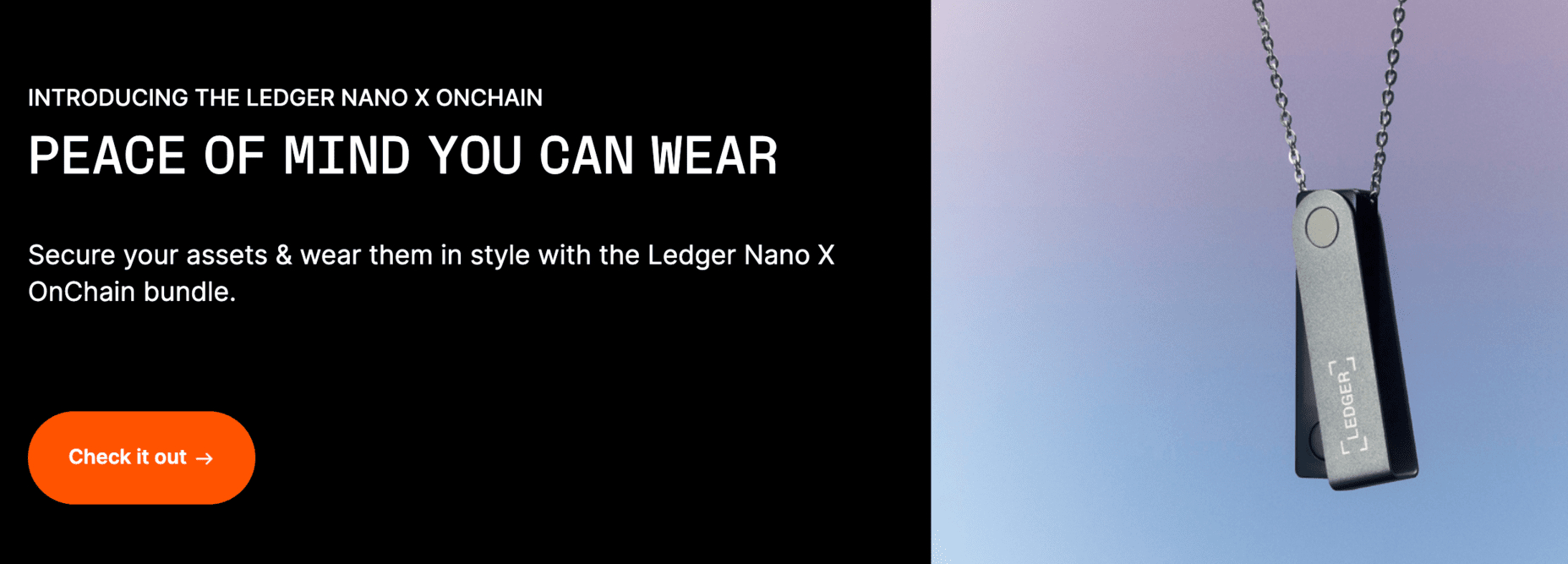
As noted by Kraken, hardware wallets are one of the most effective ways for a user to protect their private key and are a must for investors or traders who are managing extremely large sums of crypto.
It is simply not safe to have huge holdings linked to the internet at all times.
However, these wallets must be connected to another device, such as a laptop or smartphone, to initiate transactions. So, although they have a much higher security level, hardware wallets aren’t as user-friendly as software wallets.
Another downside is that as they are physical devices they come with additional cost to purchase – Trezor’s latest Model T, for example, costs in excess of $200.
Paper Wallets
The third wallet type is paper wallets. Unlike an online Bitcoin wallet, paper wallets are a type of “cold” storage that involves a user writing their public and private keys on a piece of paper.
The user would then store this piece of paper somewhere safe where nobody else could access it – for example, in a safe, safety deposit box or locker.
The downside to this approach is that those with paper wallets still eventually need to use a crypto wallet app to spend or transfer digital assets.
Thus, paper wallets are relatively impractical and considered less safe than the alternatives – hence why they aren’t widely used.
How to Find Safe Crypto Wallets
Finding the best Bitcoin wallet can be tricky – especially since so many options exist. However, we’ve identified three tactics that traders can employ to find safe crypto wallets effectively:
Use a Reputable Provider
The most important tactic to use is only choosing crypto wallets offered by reputable providers. It’s a good idea to read online reviews and check a potential provider’s track record before downloading the wallet that they offer. Many crypto wallet providers are even endorsed by high-profile individuals or businesses, which can boost credibility.
Many of the top providers listed in this guide have a long track record of success in the space and high security scores. However, even highly trusted wallets can be susceptible to attacks – Atomic Wallet was one of the leading providers in the space before North Korean hacker group Lazarus stole more than $100 million of customer funds.
Consider the Wallet’s Security Features
When choosing a Bitcoin wallet, it’s also essential to thoroughly research the wallet’s security features. We’ll explore this further in the next section, although it typically involves checking the type of encryption on offer and deciding whether to use a hot or a cold wallet.
Test the Wallet Before Making Large Transfers
Finally, it may be best to test out a wallet with a small amount of crypto before fully committing. This minimizes the risk of catastrophic loss while allowing users to test the wallet’s functionality and security features. Assuming the wallet is up to the task, users can confidently transfer more significant amounts of crypto.
How to Choose the Best Bitcoin Wallet for You
Much like when choosing between the best AI crypto trading bots, deciding which cryptocurrency wallet to use involves analyzing various factors and will also come down to user preference.
Let’s take a look at six of the most important factors to consider:
Security Features
The single most important factor to review when choosing a wallet is its security features. This includes the encryption technology it uses, how it manages the user’s private key, and any backup options it has.
Many of the best Bitcoin wallets also offer two-factor authentication and biometric verification to enhance security further. There are even multi-signature wallets, which means they have two private keys rather than one.
Cold wallets are automatically much safer than hot wallets – due to them not being connected to the internet, hackers cannot access those funds without having physical access to the hardware device.
Type of Wallet
Another important consideration is the type of wallet to use. This can be boiled down to using either one of the best hot wallets or a cold wallet. As noted earlier, the former is connected to the internet, while the latter isn’t.
A crypto hardware wallet is generally considered the safest way to store a trader’s private key. However, they can sometimes be impractical; if practicality is the primary concern, a software wallet may be more suitable.
Those trading crypto daily would likely prefer a hot wallet as they want fast and easy access to funds.
But users should always choose a cold wallet if they are holding large sums of crypto over an extended period of time, and only connect to the internet when they wish to make a specific transaction – buying, selling or transferring elsewhere – and then disconnect.
Check out the Best Crypto Cold Wallet here.
User-Friendliness
Navigating the market can be tricky for beginners, so user-friendliness is an important consideration. Users should review a wallet’s interface design and ease of setup, both of which are crucial for making the trading process accessible to beginners.
Another thing to consider is whether the wallet comes with any help or support. Most prominent providers, like OKX, have dedicated help centers with answers to the most commonly-asked questions, which can be a blessing to newbie investors.
Hardware wallets are not particularly difficult to use but add a another step compared to software wallets, with the likes of Trezor not having a mobile app on iOS also another thing to consider.
Supported Cryptocurrencies
According to CoinMarketCap, the crypto market is now valued at over $1.6+ trillion with tens of thousands of coins available.
Given the scale of the market, more new coins and tokens are springing up every week – so it’s a good idea to choose the best cryptocurrency wallet for asset selection.
Almost all crypto wallets will support the largest coins, such as Bitcoin and Ethereum. However, the top wallets also offer support for lesser-known tokens and stablecoins, which can be highly beneficial.
MetaMask is one of the best wallets for supported cryptos as it has multi-chain functionality and supports a massive range of tokens, as well as those new to the market.
Features & Functionality
Users should also check out the wallet’s features and functionality. For example, if a user wishes to invest in the best DeFi coins, they should check whether the wallet provides access to the decentralized web.
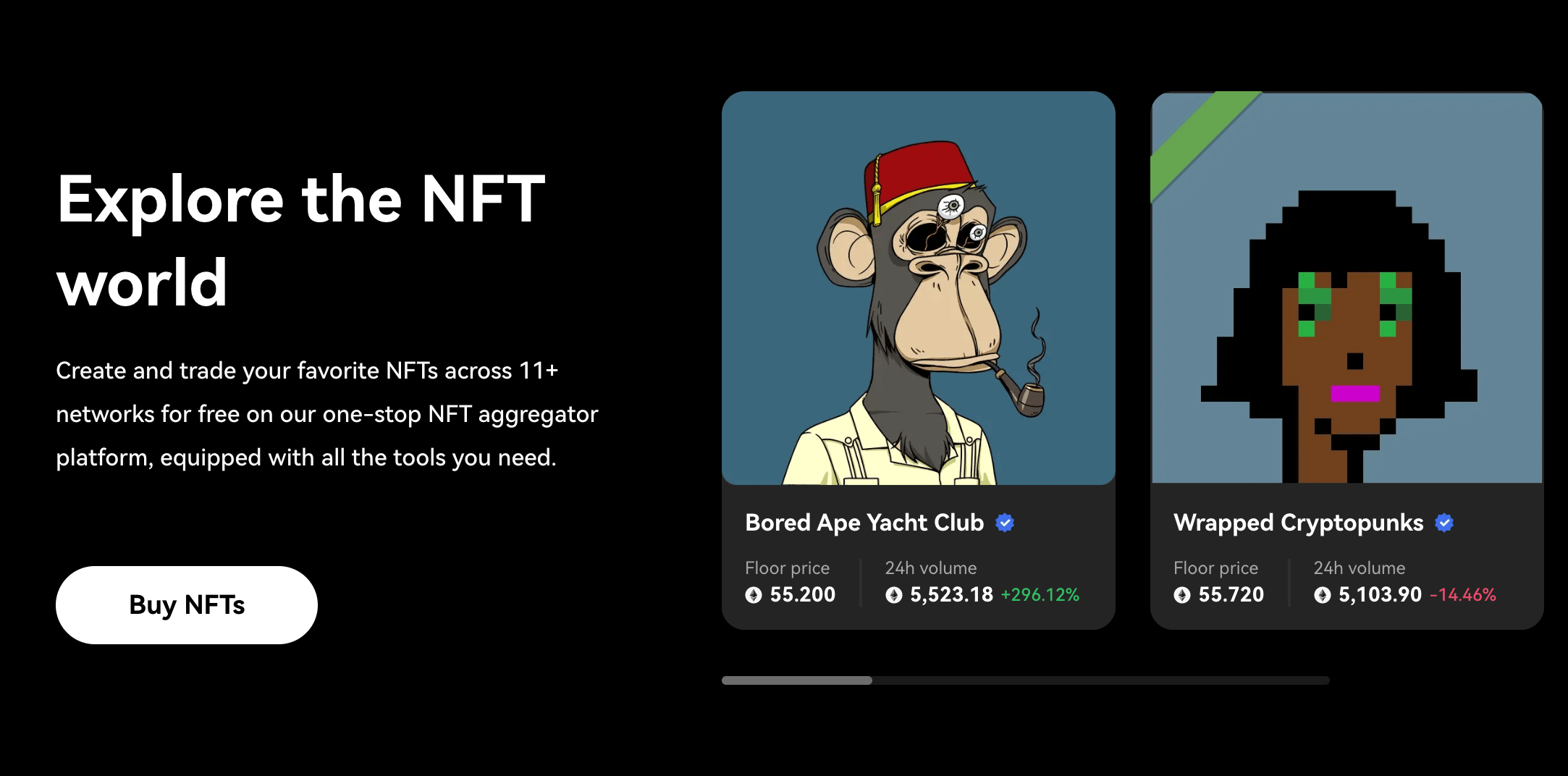
Many wallets also provide functionality for NFT storage alongside their crypto storage options. This can be a great benefit for investors interested in obtaining cryptos and NFTs to create a well-rounded portfolio of digital assets.
For NFTs specifically, investors who hold images from highly valuable collections should also consider placing them in cold storage and only connecting to the internet when carrying out a specific task such as selling.
Fees
Finally, users should also consider the fees associated with using a wallet. Most software wallets are free to download and use – the only fees to be aware of are network fees that occur during transfers.
As mentioned above, those who choose to use a Bitcoin hardware wallet must be aware that these wallets have an up-front cost since they are physical devices.
The price of these devices can vary significantly, although it usually ranges between $50 and $300, depending on the provider and model.
How to Get & Use a Crypto Wallet
Before ending this guide on the best crypto wallets, let’s look at how to download and use one of these wallets. As noted earlier, our recommended crypto wallet is ELLIPAL, which comes with a free app that’s simple to use and available on iOS and Android devices.
With that in mind, detailed below are the simple steps to download the ELLIPAL app and begin using it today:
Step 1 – Download the ELLIPAL App
ELLIPAL is available as a mobile app on both Android and iOS, so the first step is to head to the Play/App Store and download the ELLIPAL app. It is free and shouldn’t take long to be added to your phone. You can also scan a QR code on the ELLIPAL website.
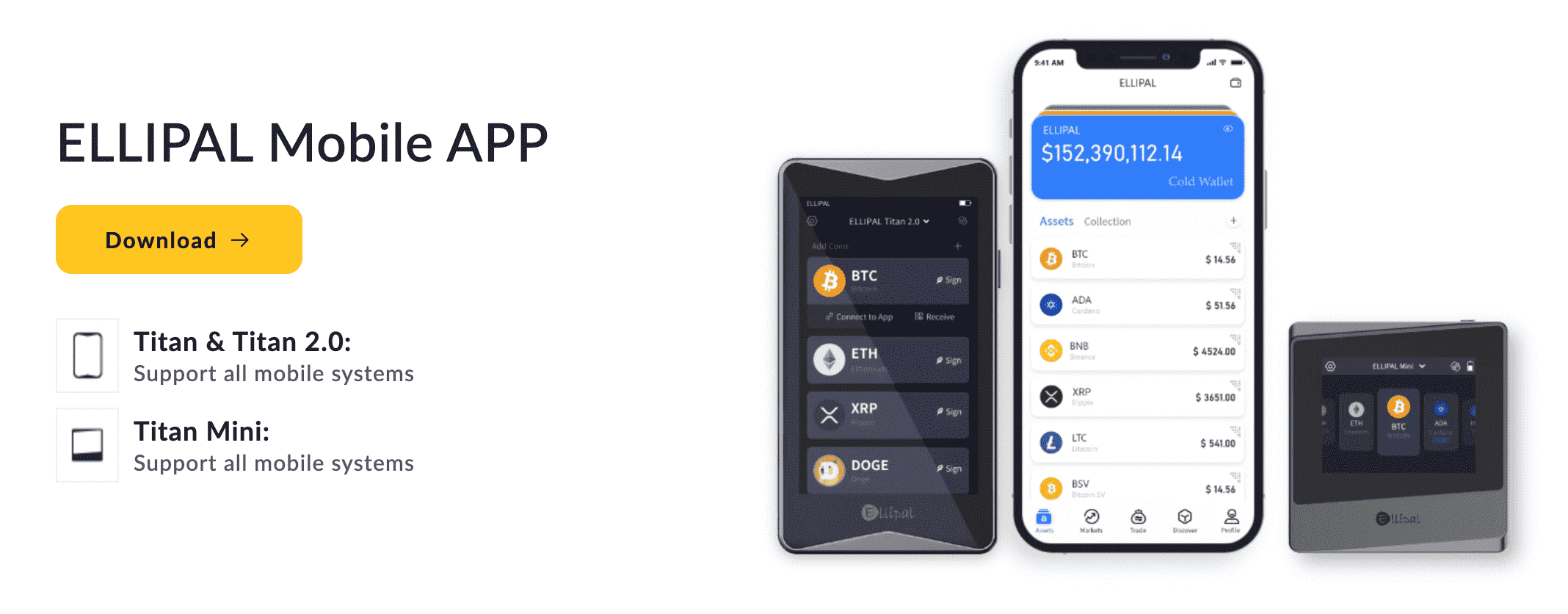
Step 2 – Create Account
Next, the app will ask you to create your account. Simply input your account name and password.
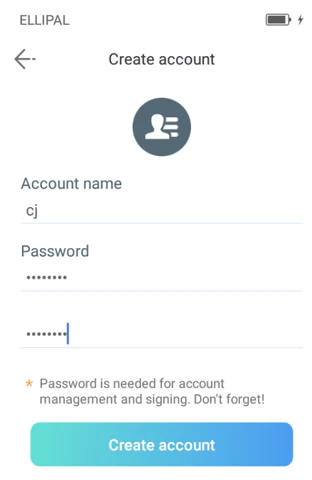
Step 3 – Confirm Security Features
Once an email address has been put in, the app will ask you to back up your mnemonic words. Read the instructions carefully here to make sure you keep your account safe. The mnemonic consists of 12 words and is used to restore your account.
Step 4 – Use the ELLIPAL App and Wallet
An account should now have been created, and users should be able to use the ELLIPAL hardware wallet, including using the app to manage their crypto assets.
Best Crypto Wallets – Conclusion
In conclusion, this guide has discussed the best crypto wallets available right now – equipping beginners with essential insights that will enable them to navigate the crypto market safely and cost-effectively.
Those seeking a user-friendly and secure option may wish to consider Zengo, a non-custodial software wallet that supports 120 cryptocurrencies. It keeps your assets secure through multi-factor authentication while you can use the Zengo mobile app to easily manage your crypto assets.
Custodial Wallets FAQs
Which is the best crypto wallet?
After extensive research and testing, we’ve concluded that Zengo offers the best crypto wallet. This wallet supports over 120 different coins/tokens, is free to download, and offers a user-friendly interface.
What is the safest crypto wallet?
Two of the safest wallets currently available are those offered by ELLIPAL and Zengo. These wallets offer multi-factor authentication and advanced security protocols to protect users in the unlikely event of a cyberattack.
Which crypto wallet has the lowest fees?
Best Wallet is completely free to use, meaning it’s an excellent option for those seeking a cost-effective option. Other wallet providers with low (or no) fees include OKX, Binance, and MetaMask.
How do I choose a good crypto wallet?
Choosing a good crypto wallet involves analyzing several essential factors. These factors include the provider’s reputation, the number of supported crypto assets, the wallet’s functionality, and also its level of security/privacy.
Is Coinbase wallet good?
The Coinbase wallet is extremely popular and is considered one of the best options for crypto traders/investors. This is because the wallet has a clean interface, allows access to thousands of dApps, and even supports NFTs.
What is the best crypto hardware wallet?
Crypto hardware wallets are those that use physical devices to store cryptocurrency offline – they can also be referred to as cold wallets. We rate ELLIPAL and Ledger as the best hardware wallets, although they both have strengths and weaknesses.
Disclaimer: Crypto is a high-risk asset class. This article is provided for informational purposes and does not constitute investment advice. You could lose all of your capital.


 Kane Pepi
Kane Pepi 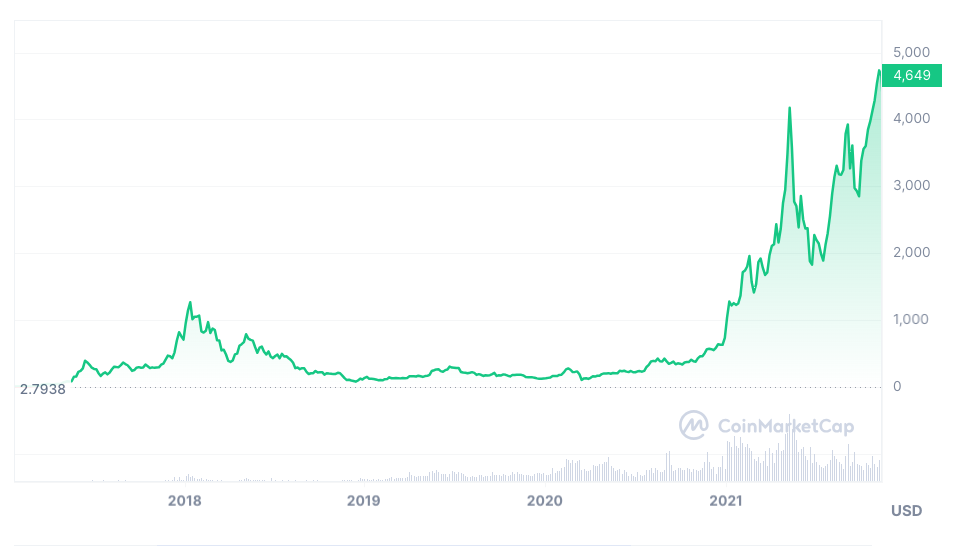
 Eric Huffman
Eric Huffman 
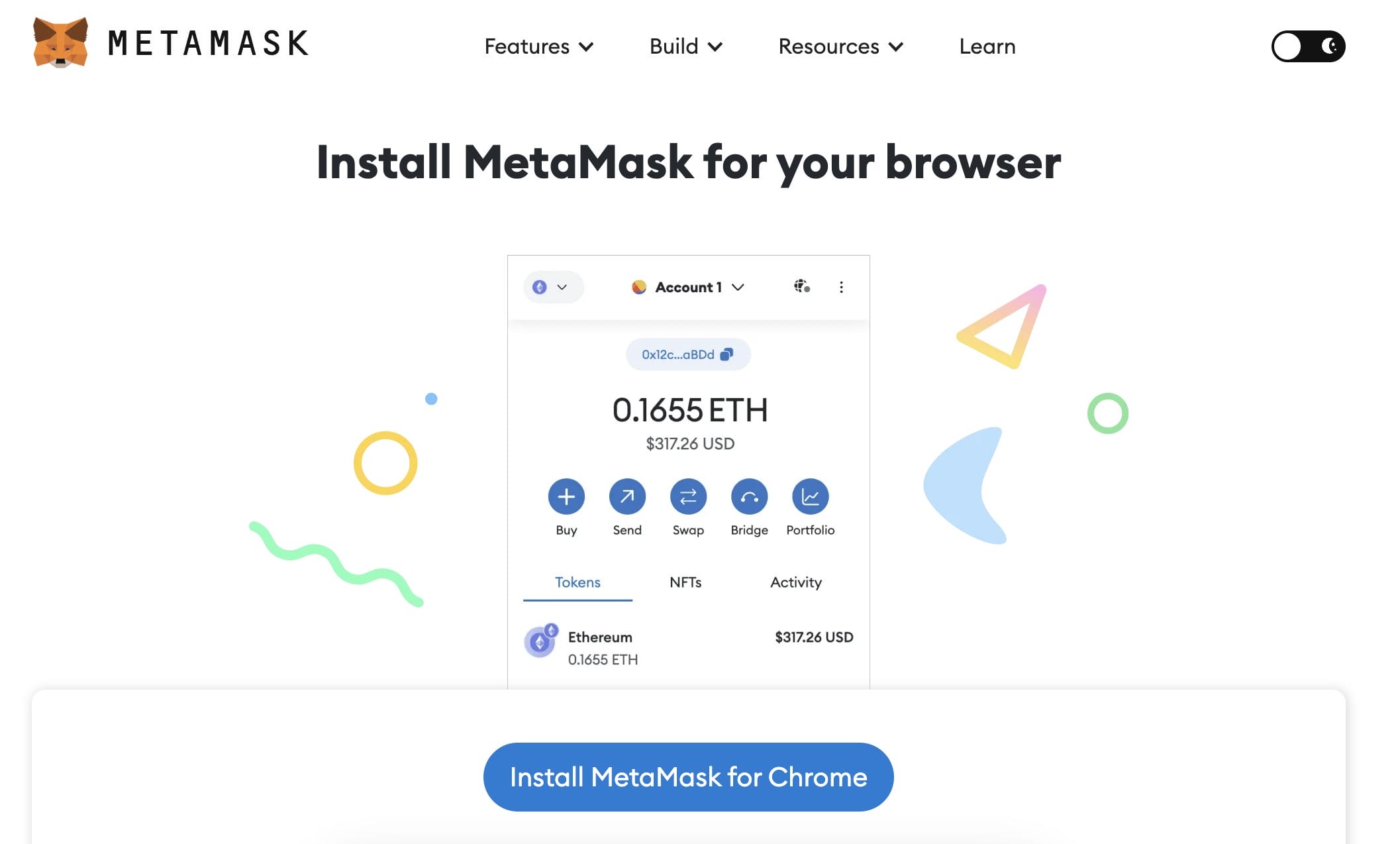
 Michael Graw
Michael Graw